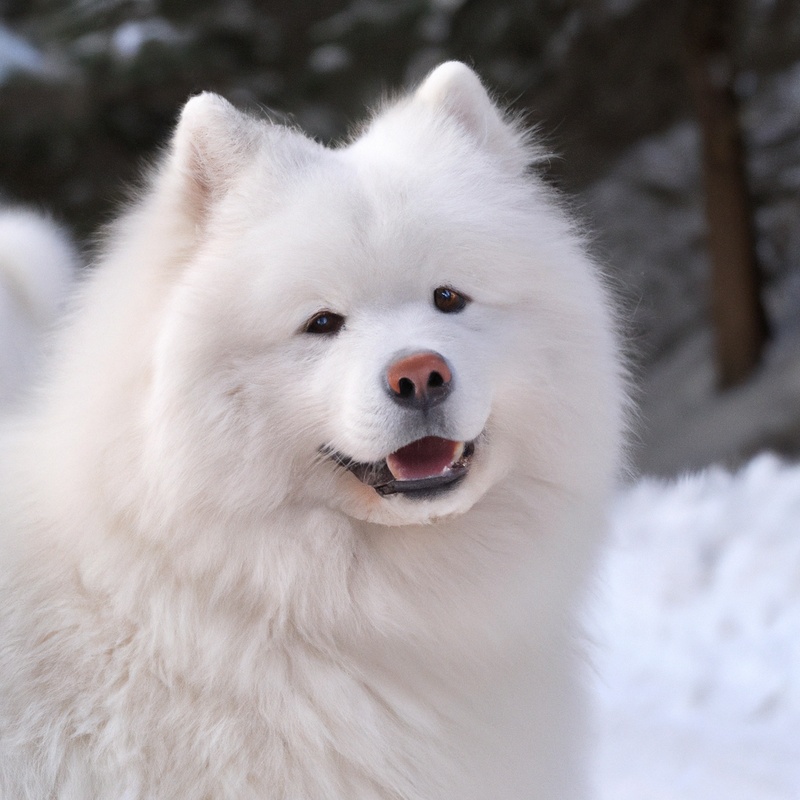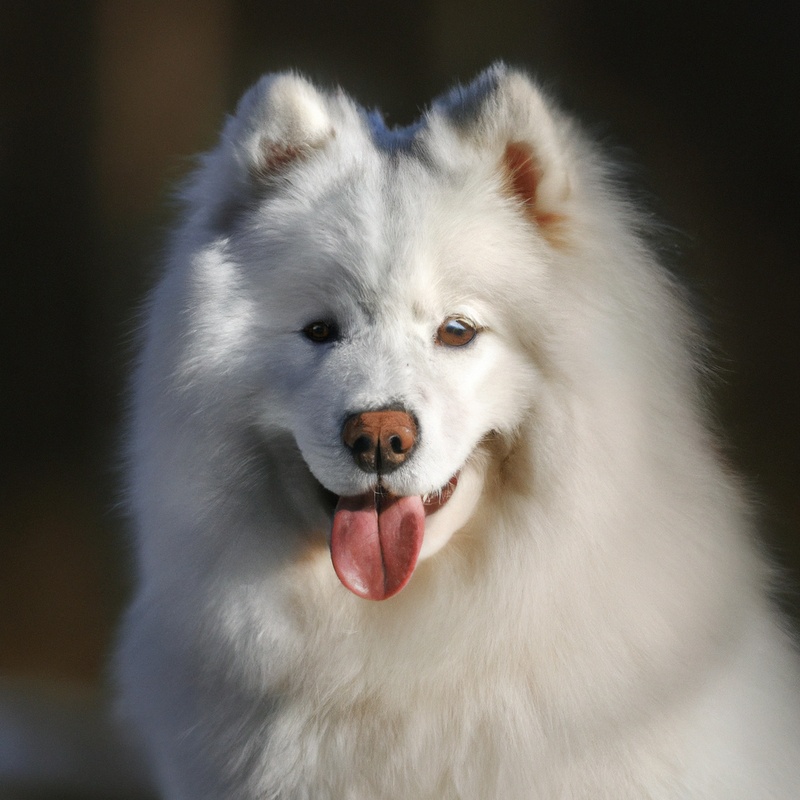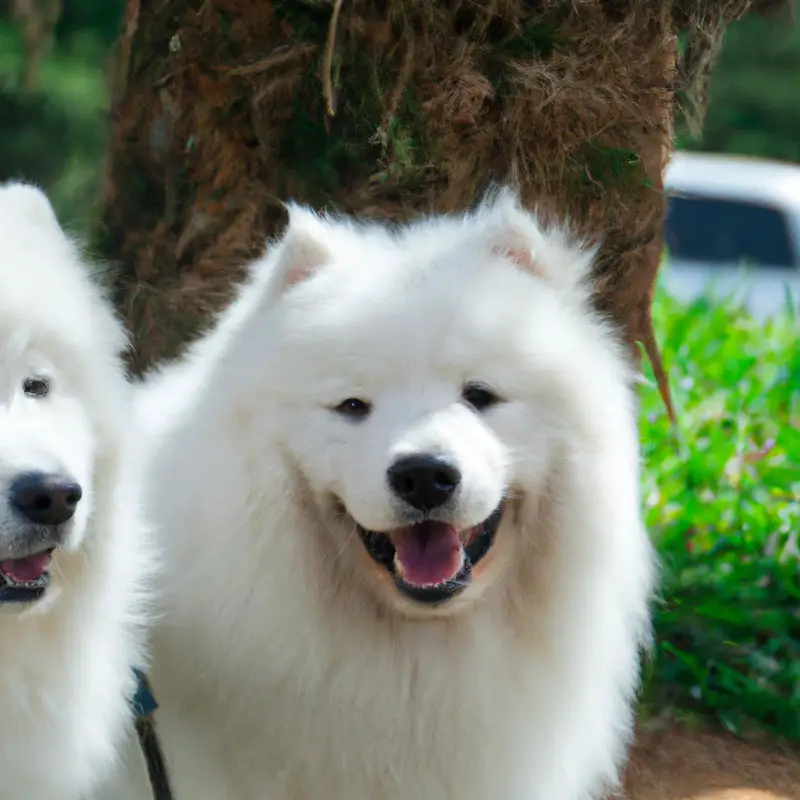How Big Do Samoyed Dogs Get?
Key Takeaways:
- Samoyed dogs are a large breed that typically reach heights of 19 to 23.5 inches at the shoulder.
- Male Samoyeds typically weigh between 45 to 65 pounds, while females generally weigh between 35 to 50 pounds.
- Proper nutrition and exercise are crucial for maintaining a healthy weight and overall well-being in Samoyed dogs.
- While size can vary slightly, Samoyeds generally fall within the range of medium to large-sized dogs.
Are you a fan of big, fluffy dogs?
If so, you’re in for a treat! Today, I want to talk about one of the fluffiest and most lovable breeds out there: the Samoyed dog.
Known for their stunning white coats and smiling faces, these dogs are a favorite among many.
But how big do Samoyed dogs actually get?
As an expert in the field, I’m here to share everything you need to know about the size of these incredible creatures.
From factors that affect their growth to common variations in size, we’ll cover it all.
Get ready to dive into the world of Samoyed sizes and discover what makes these dogs so unique!
| Age | Size |
|---|---|
| Puppy | Up to 20 inches (50 cm) |
| Adult | 21-24 inches (53-61 cm) |
| Weight | 50-65 pounds (23-30 kg) |
Average size of Samoyed dogs
Factors affecting the size of Samoyed dogs
The size of Samoyed dogs can be influenced by various factors.
Genetics plays a significant role in determining their size, as certain bloodlines may produce larger or smaller Samoyeds.
Nutrition is also essential, as a well-balanced diet can support healthy growth and development.
Exercise levels can impact size, as regular physical activity helps maintain a healthy weight.
Additionally, the age at which a Samoyed is neutered or spayed can influence their final size.
Consulting with a veterinarian can provide more personalized information on factors affecting your Samoyed’s size.

Male vs female Samoyed size differences
Male and female Samoyeds differ in size.
Typically, males are larger and heavier than females.
A male Samoyed can reach a height of 21-23.5 inches (53-60 cm) at the shoulder and weigh between 45-65 pounds (20-29 kg).
On the other hand, a female Samoyed is slightly smaller, standing at 19-21 inches (48-53 cm) in height and weighing around 35-50 pounds (16-23 kg).
It’s important to note that these are general guidelines, and individual dogs may vary in size.

Growth stages of Samoyed dogs
Samoyed dogs go through several growth stages as they mature.
- Puppy Stage: From birth to around 6 months, puppies experience rapid growth and development. They are small, playful, and require proper nutrition and socialization.
- Adolescence: Between 6 months and 2 years, Samoyeds enter their adolescent stage. They may have bursts of energy and exhibit some stubbornness. Consistent training and exercise are important during this stage.
- Adult Stage: Around 2 years old, Samoyeds reach their full size and physical maturity. They are energetic and playful but start to exhibit a calmer demeanor compared to their puppy and adolescent stages.
Monitor your Samoyed’s growth and provide appropriate care throughout these stages to ensure their overall well-being.

Determining the size of a Samoyed puppy
Puppy size at birth
Puppies of the Samoyed breed are born small and delicate, weighing around 0.5 to 1 pound. They are incredibly tiny and vulnerable during this stage.
Just like with any other breed, their size at birth is determined by genetics and the health of the mother.
It’s important to provide a warm and safe environment for the newborn puppies, ensuring they receive proper care and monitoring from their breeder or veterinarian.
Predicting adult size based on parents’ sizes
When it comes to predicting the adult size of a Samoyed dog based on their parents’ sizes, there are a few factors to consider.
The size of the parents, particularly the mother, can give you a general idea of what to expect.
However, it’s important to note that genetics can be unpredictable, and there may be some variations in size within the same litter.
Additionally, environmental factors and nutrition can also play a role in a puppy’s growth.
Keep in mind that while parental size can provide some insight, it’s not a guarantee of the exact adult size.
Growth rate and milestones in Samoyed puppies
Samoyed puppies experience rapid growth in their first year of life.
During this time, they go through several important milestones.
In the first few weeks, they double their birth weight.
By 4 months, they reach about half of their adult size.
At 6 months, they are two-thirds of their adult size.
And by the time they are one year old, they will have reached their full adult size.
It’s important to provide them with proper nutrition and regular vet check-ups to ensure their healthy development.
Common variations in Samoyed dog sizes
Smaller than average Samoyeds: Miniature or dwarf Samoyeds?
Smaller than average Samoyeds are not classified as either miniature or dwarf Samoyeds.
These terms are not recognized by the official breed standard.
Smaller Samoyeds can simply be considered as being on the smaller end of the size range for the breed.
Factors such as genetics or health issues may contribute to their smaller size.
However, it is important to note that Samoyeds come in a range of sizes, and each dog is unique.
Larger than average Samoyeds: Giant Samoyeds or mixed breeds?
Larger than average Samoyeds can be either giant Samoyeds or mixed breeds. Giant Samoyeds are the result of selective breeding for increased size.
On the other hand, mixed breeds can have Samoyed ancestors along with larger breeds, which contributes to their larger size.
It is important to note that the size of a Samoyed can vary significantly even within purebred dogs. Therefore, if you are specifically looking for a larger Samoyed, it is advisable to do thorough research and consult with reputable breeders to find the right fit for you.
Caring for a large Samoyed dog
Exercise and activity requirements
Samoyed dogs are a high-energy breed that requires regular exercise and mental stimulation.
Daily walks and playtime are essential to keep them happy and healthy.
Engaging in activities like fetch, obedience training, and agility can help meet their exercise needs.
It’s also important to provide them with environmental enrichment, such as puzzle toys and playdates with other dogs, to prevent boredom.
Regular exercise is not only physically beneficial for Samoyeds, but also helps to prevent behavioral issues that can arise from pent-up energy.
So make sure to incorporate plenty of exercise and mental stimulation into your Samoyed’s daily routine.
Nutrition and diet considerations
When it comes to nutrition and diet considerations for your large Samoyed dog, there are a few things you should keep in mind.
Firstly, make sure you’re feeding them a high-quality dog food that is specifically formulated for large breeds.
Look for one that contains real meat as the first ingredient and doesn’t have any fillers or artificial additives.
Secondly, portion control is important to prevent obesity, so be mindful of how much you’re feeding them.
Lastly, consider adding supplements like fish oil or joint support if recommended by your vet.
Overall, a balanced and healthy diet is key to keeping your Samoyed happy and thriving.
Health risks and preventative measures for large Samoyeds
Large Samoyeds face specific health risks that owners need to be aware of. Some common issues include hip dysplasia, which can be minimized by regular exercise and maintaining a healthy weight.
Other concerns are dental problems, so daily teeth brushing is important.
Regular grooming is also necessary to prevent skin infections. Additionally, large Samoyeds are prone to bloat, which can be reduced by feeding them smaller meals throughout the day and avoiding exercise immediately after meals.
Overall, a balanced diet, regular exercise, and routine check-ups with a veterinarian are key to keeping large Samoyeds healthy.
Frequently Asked Questions about the size of Samoyed dogs
What is the average weight and height of an adult Samoyed?
An adult Samoyed typically weighs between 45 to 65 pounds (20 to 30 kilograms) and stands at a height of around 19 to 23.5 inches (48 to 60 centimeters) at the shoulder.
However, it’s important to note that these are average measurements and individual Samoyeds may vary in size.
Factors such as genetics, diet, and exercise can also influence a dog’s size.
Consulting with a veterinarian is recommended for accurate information about your specific Samoyed.
Can Samoyeds grow bigger than the standard size?
Samoyeds can grow bigger than the standard size, but it is not very common.
The standard size for a Samoyed is around 21 to 23.5 inches (53 to 60 cm) at the shoulder for males, and slightly smaller for females.
However, there are some Samoyeds that may reach heights of up to 25 inches (64 cm) or even slightly more.
Keep in mind that size can vary within the breed, and genetics play a role in determining a dog’s size.
What should I do if my Samoyed is not growing as expected?
If your Samoyed is not growing as expected, there are a few steps you can take. First, ensure they are getting a balanced and nutritious diet.
Consult with your veterinarian to determine if any nutritional adjustments are necessary.
Second, make sure they are getting enough exercise and mental stimulation. Regular physical activity can promote healthy growth.
Lastly, schedule regular check-ups with your vet to rule out any underlying health issues.
They will be able to provide guidance and support throughout your Samoyed’s growth process.
Do smaller or larger Samoyeds have any specific health issues?
Smaller or larger Samoyeds don’t have any specific health issues directly related to their size.
However, both sizes can experience common health concerns that are not size-dependent.
These include hip dysplasia, progressive retinal atrophy, and diabetes.
Regular veterinary check-ups, a balanced diet, exercise, and proper grooming are important for maintaining the overall health and well-being of all Samoyeds, regardless of their size.
Final Verdict
The size of Samoyed dogs can vary, but on average, they are medium to large-sized dogs. Factors such as genetics, nutrition, and overall health can influence their size.
Male Samoyeds tend to be larger than females.
Predicting the adult size of a Samoyed puppy can be done by considering the sizes of their parents and monitoring their growth rate and milestones. It’s important to provide proper care for large Samoyeds, including regular exercise, a balanced diet, and preventative measures for potential health risks.
In summary, understanding the factors that affect Samoyed size and providing appropriate care can help ensure a healthy and happy companion.








